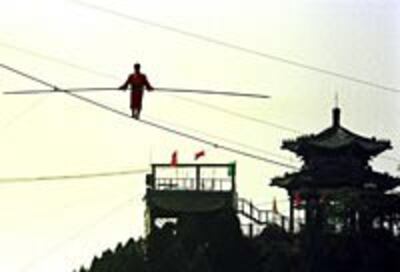
A Uyghur acrobat who has already crossed one of China’s rugged Yangtze River gorges by tightrope has now set his sights on a stretch of water between the toe of Italy’s boot and the island of Sicily.
Adil Hoshur was invited to perform the daring 3.6-km (2.2-mile) crossing by an Italian film company that wants to include him in a documentary film about wire-walking, he told RFA’s Uyghur service from his home in Urumqi, northwestern China.
“An Italian film company expressed interest in my walking a high-wire over the sea near the island of Sicily, as they are planning to produce a film about high-wire walking,” Hoshur, known among Uyghurs as the “King of the Sky” or “Skywalker,” told reporter Aqida.
“They asked me to inspect the area to see if I could do the walk. So I went to the spot. I felt that it was really difficult to walk it,” he said.
Sicilian challenge
The Messina Strait, between Sicily and the Italian mainland, measures 3.65 kms (2.27 miles) across, and Hoshur said he would be working at an elevation of around 300 meters (1,000 feet), with an international container port below much of the crossing.
They asked me to inspect the area to see if I could do the walk. So I went to the spot. I felt that it was really difficult to walk it.
The film recording the feat, “Dawaz: la fune sul mare” (in English, “Dawaz: Wire above the sea”), will be shot by Italian director Domenico Distilo, backed by film producers l’Eskimoza and Rai Cinema. Distilo, who hails from the Messina region himself, travelled all the way to Urumqi to approach Hoshur about the project.
“When I saw that the place is also quite windy, my first impression was that it was dangerous to cross over the region on a tightrope,” said Hoshur, who made his name wire-walking across one of China’s Three Gorges during the 1990s.
But after conferring with his brother, Erkin Hoshur, an expert in setting up high-wire cables, Hoshur agreed to make the hazardous crossing, which has been scheduled for Sept. 1-10, he said.
Darwaz, the Uyghur word for tightrope-walking, is a traditional art among the eight million Turkic-speaking Muslim Uyghurs, whose homeland is currently ruled by China.
More than just an art form, the activity epitomizes the struggle for Uyghur culture to hold its own, especially under the shadow of China, which gets a large proportion of its national resources from Xinjiang. Hoshur’s family has done wire-walking for 430 years.
But local Italian governments are hoping the event, and particularly the film, will showcase the places and people of the region alongside Hoshur’s daring, attracting tourists to Calabria and Sicily, on either side of the Strait.
Permission needed
“At this time, we have decided the event is going to take place. But the main concern is that the navy has to agree that we can put up the wire. I am told that if allowed, we can request that sea traffic be stopped for 12 hours. If it is allowed, we are planning to do the event between Sept. 1 and Sept. 10,” he said.
Hoshur said he also had plans to open a wire-walking school near his home in Yingisar county, near Kashgar, in the Xinjiang Uyghur Autonomous Region of China.
He also wants to introduce wire-walking as an Olympic sport, perhaps in time for the 2012 or 2016 Games, he said.
Hoshur, who comes from an ethnic group in which strong anti-Beijing feeling is voiced repeatedly, said he wouldn’t discriminate in the students he took on at his new academy.
“I will teach anyone, regardless of where he or she is from around the world,” he said. “I will not discriminate based on their ethnicity, nationality, or origin.”
“I will be staying at the school for six months of the year, to teach my courses. For the rest of the year, I have to do my own activities. Before I get older, I want to fulfill my plans,” said Hoshur, who said there were still a large number of walks he would still like to make.
Original reporting in Uyghur by Aqida. RFA Uyghur service director: Dolkun Kamberi. Additional reporting in Italian by Francesca Mengarelli. Written for the Web in English by Luisetta Mudie and edited by Sarah Jackson-Han.
